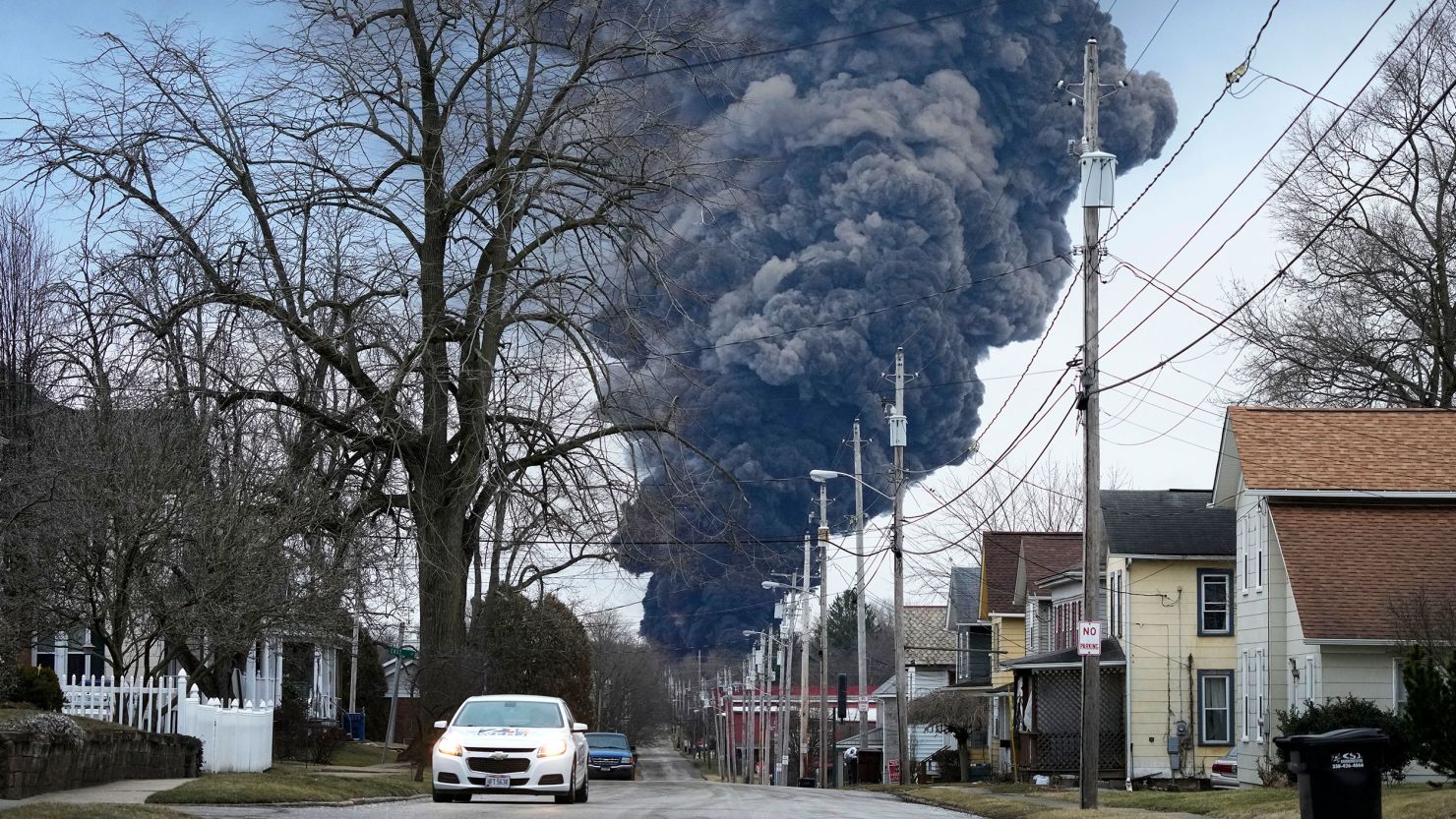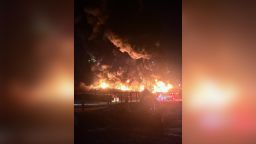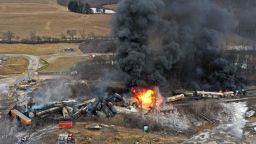Residents of the Ohio village of East Palestine remain unable to return home after a controlled release Monday of a toxic chemical from cars that were part of a train derailment three days ago, Mayor Trent Conaway said during an evening news conference.
An operation to drain vinyl chloride – a chemical that officials said was unstable and could explode – from five Norfolk Southern rail cars began just after 4:30 p.m. ET.
Scott Deutsch of Norfolk Southern had earlier said small, shaped charges would be used to blow a small hole in each rail car. The vinyl chloride would then spill into a trench where flares would ignite and burn it away.
As of 7 p.m., the flames were reduced and a small fire continues in the pit, Deutsch said at the news conference.
It is “still an ongoing event so we just ask everybody to stay out,” the mayor said. “We have to wait to the fires die down.”
An evacuation zone of 1 mile around the train’s crash site remains in place, Conaway said. Authorities will reassess the zone Tuesday morning, he added. “We really don’t have a time frame right now” for the return of residents, he said.
A team from the Environmental Protection Agency will monitor the air and water quality in the area, officials said.
The remaining fires will go out on their own and won’t be extinguished by crews, Deutsch said.
Prior to the controlled release Monday, officials worried the five derailed cars carrying vinyl chloride might hurl toxic fumes into the air and shoot “deadly shrapnel” as far as a mile away.
One rail car in particular had been a focus of concern because its malfunctioning safety valves had prevented the car from releasing the vinyl chloride inside, a Columbiana County Emergency Management Agency official and a Norfolk Southern spokesperson told CNN earlier Monday.
Ahead of the controlled release, the evacuation zone surrounding the fiery derailment site expanded to two states, Ohio Gov. Mike DeWine said.
DeWine and Pennsylvania Gov. Josh Shapiro had ordered evacuations for a 1-mile-by-2-mile area surrounding East Palestine, a village of about 5,000 people near the Pennsylvania border, DeWine said.
This followed evacuations that took place just after the massive inferno began Friday night.
According to East Palestine resident Eric Whiting, police knocked on his door about an hour after the derailment and asked the family to evacuate.
“They told me they didn’t know anything yet, but they just needed us to evacuate,” Whiting told CNN.
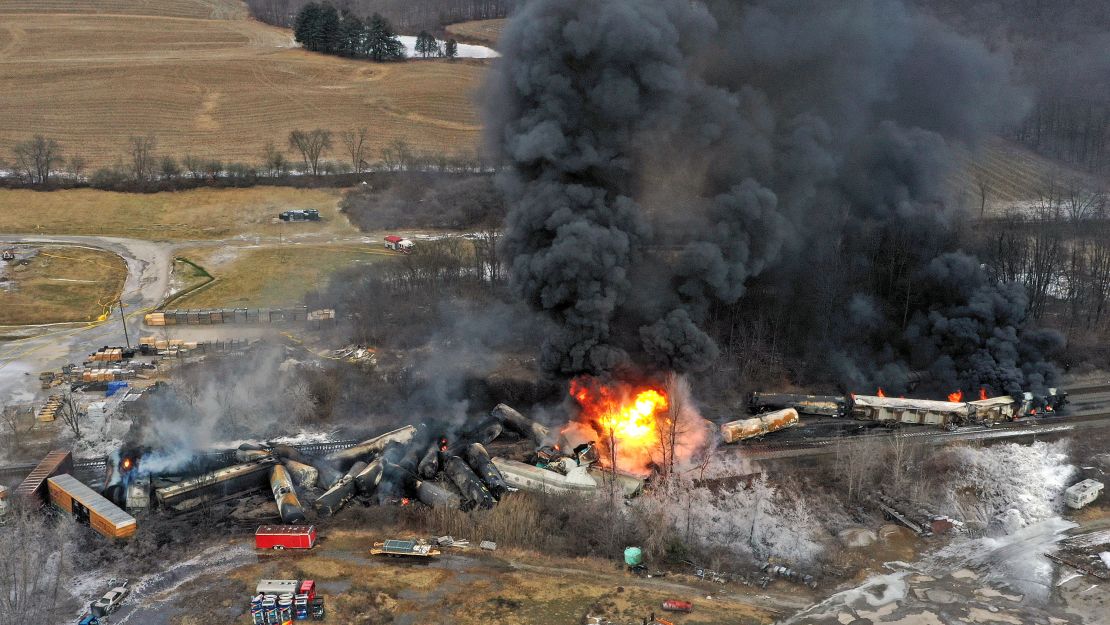
Officials begged residents for several days to leave the area as fears about air and water quality have mounted.
Mayor Conaway said Monday he was “proud of the citizens” as everyone cleared out when officials went door-to-door and there were no arrests.
Here’s the latest on the ground:
? Police shift communications hub: The scene was so dangerous by Monday morning that the East Palestine Police Department had evacuated a communications center for safety reasons, a spokesperson told CNN by phone Monday. “911 service will not be affected,” the department posted online.
? Schools are closed: The East Palestine City School District will be closed for the rest of the week, citing a local state of emergency.
? A mechanical issue was detected: The crew was alerted by an alarm shortly before the derailment “indicating a mechanical issue,” a National Transportation Safety Board (NTSB) member said. An emergency brake was applied, but about 10 cars carrying hazardous materials derailed.
Evacuated family staying in a hotel, awaiting further news
Whiting, the East Palestine resident, said he, his wife and three children took nothing with them when they evacuated Friday.
“We live right by the railroad, so we heard the train come to an abrupt stop. But by the time I got dressed to check out what was happening, I heard emergency vehicles rushing towards us,” Whiting told CNN on Monday.
The family returned home Saturday and stayed overnight. But law enforcement officers knocked on the door Sunday morning telling them to leave due to the potential for an explosion.
So, they packed up clothes for a few nights and, along with their dog, headed to a hotel 20 minutes away.
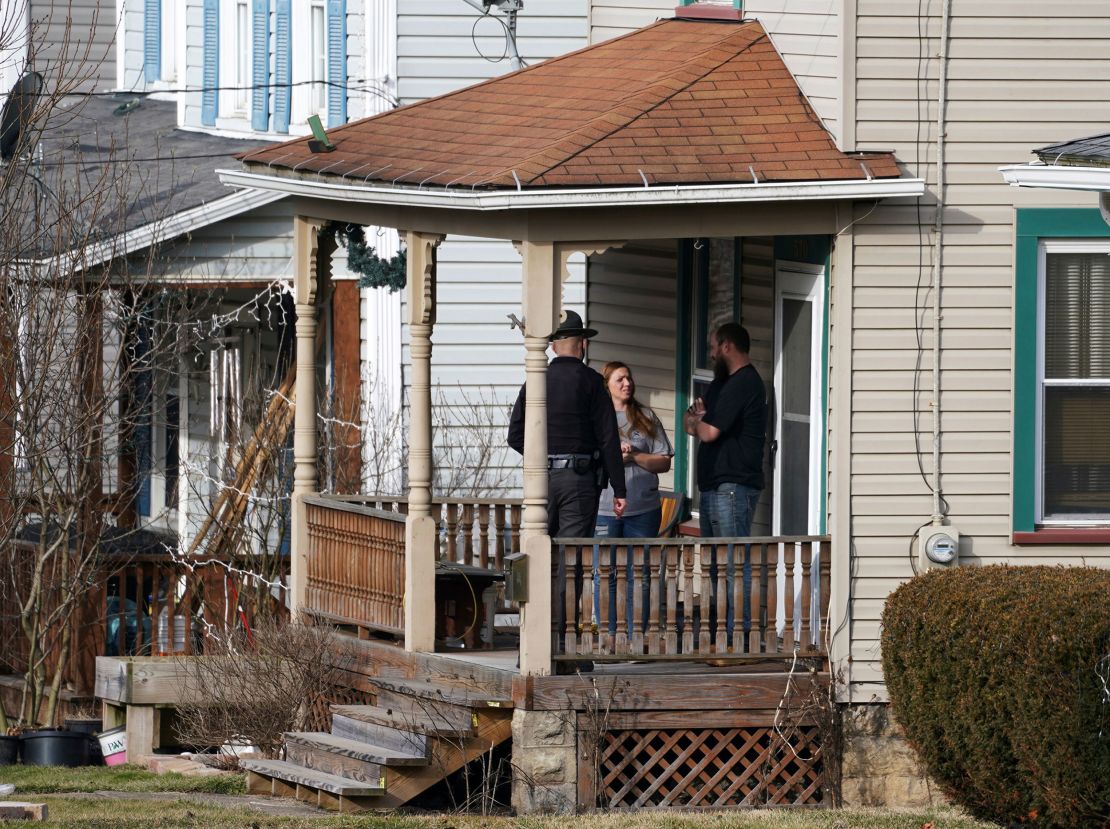
“It’s difficult. I’m in a cheap motel because I’m afraid of how much they’ll be willing to reimburse me for. It’s hard to take my laptop out (to work) and focus when I’m worried about getting food for the family throughout the day,” Whiting said.
He’s also worried what the environmental impact on East Palestine will be, he said.
Breathing high levels of chemical is potentially fatal
A “drastic change” was detected Sunday related to the vinyl chloride, Fire Chief Keith Drabick said.
Breathing high levels of vinyl chloride can make someone pass out or die if they don’t get fresh air, the Ohio Department of Health said.
The man-made chemical used to make PVC burns easily at room temperature; can cause dizziness, sleepiness and headaches; and has been linked to an increased risk of cancer in the liver, brain, lungs and blood.
“If a water supply is contaminated, vinyl chloride can enter household air when the water is used for showering, cooking, or laundry,” the National Cancer Institute says.
While air and water quality remained stable Sunday, “things can change at any moment,” James Justice of the EPA’s Emergency Response warned.
According to the Centers for Disease Control and Prevention: “Vinyl chloride in water or soil evaporates rapidly if it is near the surface. Vinyl chloride in the air breaks down in a few days, resulting in the formation of several other chemicals including hydrochloric acid, formaldehyde, and carbon dioxide.”
The agency also warns that liquid vinyl chloride that touches skin will numb it and produce redness and blisters.
Crew got mechanical failure warning before wreck
There was a mechanical failure warning before the crash, NTSB Member Michael Graham said Sunday. About 10 of 20 cars carrying hazardous materials – among more than 100 cars in all – derailed, the agency said.
“The crew did receive an alarm from a wayside defect detector shortly before the derailment, indicating a mechanical issue,” Graham said. “Then an emergency brake application initiated.”
Investigators also identified the point of derailment and found video showing “preliminary indications of mechanical issues” on one of the railcar axles, Graham said.
NTSB is still investigating when the potential defect happened and the response from the crew, which included an engineer, conductor and conductor trainee, Graham added.
Investigators have also requested records from Norfolk Southern, including track inspection records, locomotive and railcar inspections and maintenance records, train crew records and qualifications, Graham said.
Rail travel is recognized as the safest method of transporting hazardous materials in the US, according to the US Department of Transportation’s Federal Railroad Administration.
“The vast majority of hazardous materials shipped by rail tank car every year arrive safely and without incident, and railroads generally have an outstanding record in moving shipments of hazardous materials safely,” the administration said.
Correction: An earlier version of this story incorrectly described the potential fallout from five derailed train cars carrying vinyl chloride. Officials said it was a possibility that toxic fumes and deadly shrapnel could be dispersed.
CNN’s Steve Almasy, Hannah Sarisohn, Nouran Salahieh, Gabe Cohen, Laura James, Tina Burnside, Cara-Lynn Clarkson, Christina Zdanowicz, Jason Carroll and Kelly McCleary contributed to this report.



